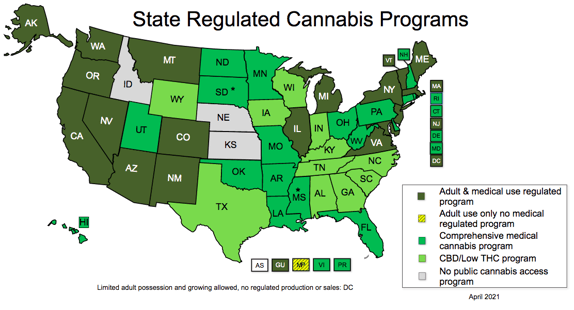The latest data from Pew Research is in, and the trend is clear: Americans overwhelmingly support the legalization of cannabis. The share of U.S. adults who say that marijuana should be legal rose to 91% in 2021, with more than 60% saying that marijuana should be legal for medical and recreational use, and 31% saying it should be legal for medical use only. Fewer than one-in-ten (8%) say marijuana should not be legal for use by adults.
More and more states are changing their laws to embrace this attitude. The National Council of State Legislatures, which tracks state legislation across all policy areas, now counts 17 states, two territories, and the District of Columbia among those jurisdictions which have enacted legislation to regulate cannabis for adult use. When you count the states that have voted to change their laws (but have not yet enacted legislation) the number rises to 36 states and 4 territories. Oregon has gone so far as to decriminalize possession of small amounts of hard drugs.
 Map Source: National Council of State Legislatures
Map Source: National Council of State Legislatures
The medical and social benefits of legalization
The first stop on the road to full legalization was the medical marijuana movement, with advocates successfully arguing that individuals living with glaucoma, Alzheimer’s, AIDS, and a range of other conditions deserve access to marijuana as a helpful therapeutic substance. As attitudes have shifted, the legalization debate has since intersected with America’s ongoing dialogue on race and racism, as well as criminal justice and social policy.
Even as many states move toward legalization, the Marshall Project (a nonprofit news organization focused on criminal justice) reports that drug-related violations were the most frequent cause for arrest in 2018, with nearly 40% of those arrests made for marijuana possession alone. Black people make up 27% of drug arrests, but only 13% of the country. Legalization offers an opportunity to undo this societal harm by minimizing low-level marijuana possession arrests and legislating a path to release from prison and the expungement of criminal records.
Cannabis tax revenue is earmarked for investments in health and social equity
Some states that legalized earlier than others have already generated more than $1 billion in marijuana tax revenue. The structure of new legalization laws in states likes Virginia, New Jersey, and New York have earmarked investments in equity based on a “recognition that the war on drugs was and is a racist institution that purposefully harmed communities of color for decades,” according to the Brookings Institution.
With an approach shared by many states, New York anticipates receiving $350 million in yearly tax revenue and has dedicated 40% to reinvestment in disproportionately impacted communities via grants for local governments and community organizations to fund programs. At the same time, new laws are seeking to reverse the racial monopoly in the legal marijuana industry itself—81% of marijuana businesses are owned by white people—by setting specific goals for equitable distribution of cannabis licenses.
But are there hidden risks to public health?
Naturally, there are detractors to a legalization argument of this magnitude. Professor Rosalie Paccula at the University of Southern California has raised public health concerns about rising cannabis usage, including “increases in impaired driving, increases in adverse effects among pregnant and/or nursing women who use cannabis, increases in acute psychosis and emergency department visits, increases in cannabis use disorder and dependence, and increases in vaping-related lung injuries.”
Recognizing the evidence of rising cannabis usage, the American Public Health Association has gone on the record calling for “an evidence-based public health approach to regulating and controlling the legal commerce of cannabis products” that mirrors the well-established federal and state framework of regulations for tobacco and alcohol sales, advertising, and marketing. This approach to regulation may offer the best mix of evidence-based policy for legalization—allowing states to reap the revenues and improve health and social equity—while minimizing health harm to the public.
